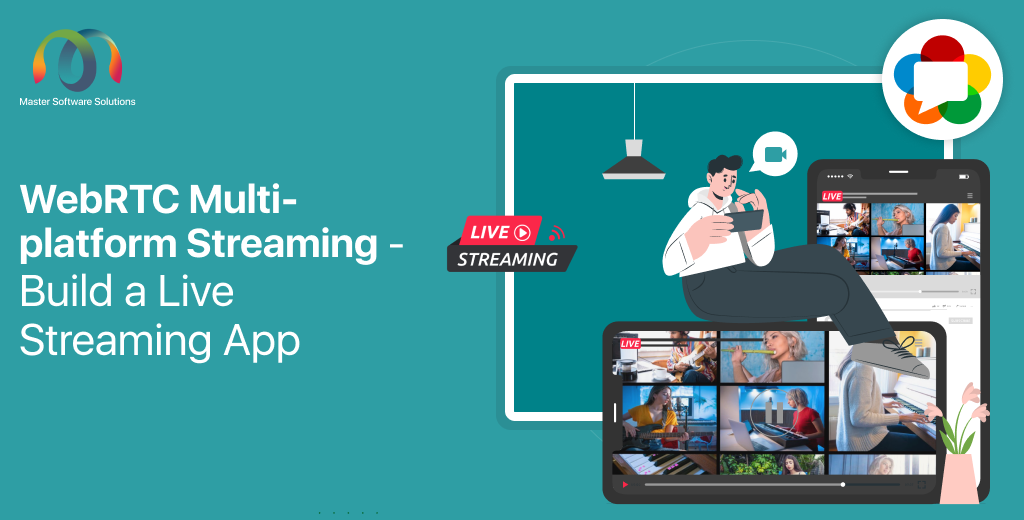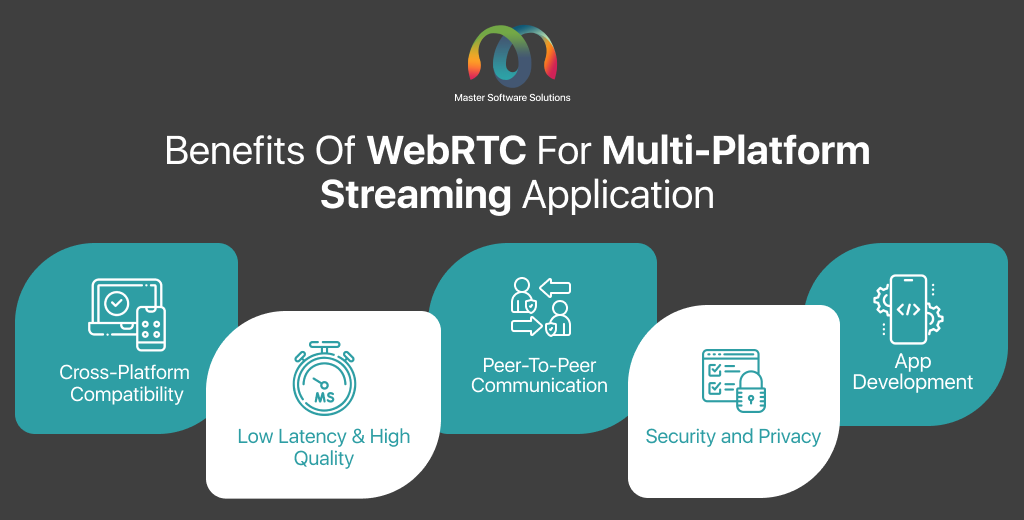WebRTC Multi-platform Streaming – Build a Live Streaming App

Live digital connectivity is necessary for online communication, facilitating real-time interaction and engagement. The demand for seamless streamlining solutions has increased for broadcasting a live event, conducting virtual meetings, or connecting with the audience in real time.
WebRTC (Web Real-time Communication) has revolutionised communication, taking it digital by enabling peer-to-peer audio, video, and data transfer directly within web browsers and mobile applications. Using WebRTC technology for real-time communication reduces latency and offers high-quality go-to real-time communication solutions for various applications. These solutions include video conferencing, online gaming, and, of course, live streaming.
This blog will discuss the ins and outs of WebRTC multi-platform streaming and how you can build a live streamlining app.
What is WebRTC multi-platform streaming?
WebRTC multi-platform streaming uses WebRTC technology to stream audio, video and data on multiple platforms simultaneously. The technology enables peer-to-peer (direct communication) communication within web browsers and mobile applications without additional plugins or software installations.
WebRTC allows developers to create and design applications to deliver live content – video, audio or data transfer to users on different devices and operating systems – desktop computers, laptops, smartphones, and tablets. WebRTC helps users seamlessly access live streams regardless of their preferred platform, enhancing accessibility and the user experience.
What are the benefits of using WebRTC for multi-platform streaming?
WebRTC is a robust and versatile framework for multi-platform streaming. It enables developers to create immersive, interactive, and scalable live-streaming applications. It helps cater to diverse audiences across the web and mobile devices.
Using WebRTC for multi-platform streaming offers several significant benefits:
- Cross-platform compatibility – WebRTC technology is compatible with major web browsers and is available as a native API on mobile platforms like iOS and Android. The technology ensures seamless streaming experiences across desktops, laptops, smartphones, and tablets without additional plugins or software installations.
- Low latency and high quality – WebRTC offers low-latency streamlining features, ensuring real-time communication. Low latency in interactive applications such as live video chat, online gaming, and virtual events is essential to minimising delays between users. Reduced delays ensure a smooth user experience. WebRTC provides high-quality audio and video streaming with adaptive bitrate control. This tool ensures the best media quality based on their network conditions and device capabilities. Using WebRTC technology helps maintain a consistent streaming experience across various platforms.

- Peer-to-peer communication – Peer-to-peer communication implies direct data exchange between users without intermediaries. WebRTC is a decentralised approach that reduces dependency on centralised servers. It results in faster data transmission and improved scalability for large-scale streaming applications.
- Security and privacy – WebRTC includes built-in encryption and authentication to protect users’ privacy and data integrity during communication. Security and privacy in WebRTC ensure the safe and confidential transmission of sensitive data, such as audio and video streams.
- App development – WebRTC offers APIs and libraries for developers to integrate real-time communication features into their applications efficiently and effectively. Developers can leverage extensive documentation, community support, and cross-platform compatibility to build multi-platform solutions. If you want to create a WebRTC multi-platform streaming application, contact us to discuss your needs and how we can help.
Read More: WebRTC API Development – Integrate Real-time Communication Features
How can I build a WebRTC multi-platform streaming application?
Creating a WebRTC (Web Real-Time Communication) multi-platform streaming solution requires several steps.
Here’s a high-level overview:
- Understand WebRTC – Start with a basic understanding of WebRTC technology and components – getUserMedia, RTCPeerConnection, and RTCDataChannel. Study how WebRTC enables real-time communication between web browsers.
- Choose a server – Choose between a pre-built WebRTC server or your signalling servers, like Kurento, Janus, and Jitsi. If you implement your own server, you should handle signalling, session management, and relay servers.
- Set-up signalling – Signalling facilitates communication between peers. It involves exchanging control messages, negotiating session parameters, and coordinating communication.
- Media stream handling – Use getUserMedia to capture audio and video from the user’s devices. Encoding and decoding media streams are also required to ensure cross-platform compatibility.
- Establish peer connections – RTCPeerConnection establishes direct peer-to-peer connections between the clients. The process involves negotiating the media capabilities to establish connections and manage media streams.
- Implement cross-platform compatibility – The solution should work across web browsers and devices. Test the compatibility on different platforms to identify and address the issues.
- Network challenges – Handle challenges – latency, packet loss, and bandwidth constraints. It involves implementing adaptive bitrate streaming, packet loss recovery mechanisms, and network congestion control.
- Security considerations – Implement media stream encryption using Secure Real-time Transport Protocol (SRTP) and signalling protocols to protect user data and ensure privacy.
- User interface – Design a user-friendly interface. Provide controls for starting and stopping streams, adjusting settings, and interacting with other participants.
- Test and deploy – Test the application. Ensure reliability, performance and scalability. Deloy your solution to production and monitor its performance over time.
Developing a WebRTC multi-platform streaming solution requires a solid understanding of web development, networking, and real-time communication principles. It’s also essential to stay updated with the latest developments in WebRTC technology and best practices. You can also opt for third-party WebRTC multi-platform streaming application development. They are highly skilled and experienced.
How can we help you?
Master Software Solutions is one of the best tech-service-providing companies, with more than 11 years of experience and a team of more than 90 tech experts. We have successfully delivered WebRTC application development services for 9+ years. Our WebRTC development services help you build browser add-ons and set up data and media connections. We assist in integrating any third-party API to improve the performance of your application. If you are also looking forward to WebRTC application development, schedule a call with our experts to discuss your business requirements and see how we can help you.